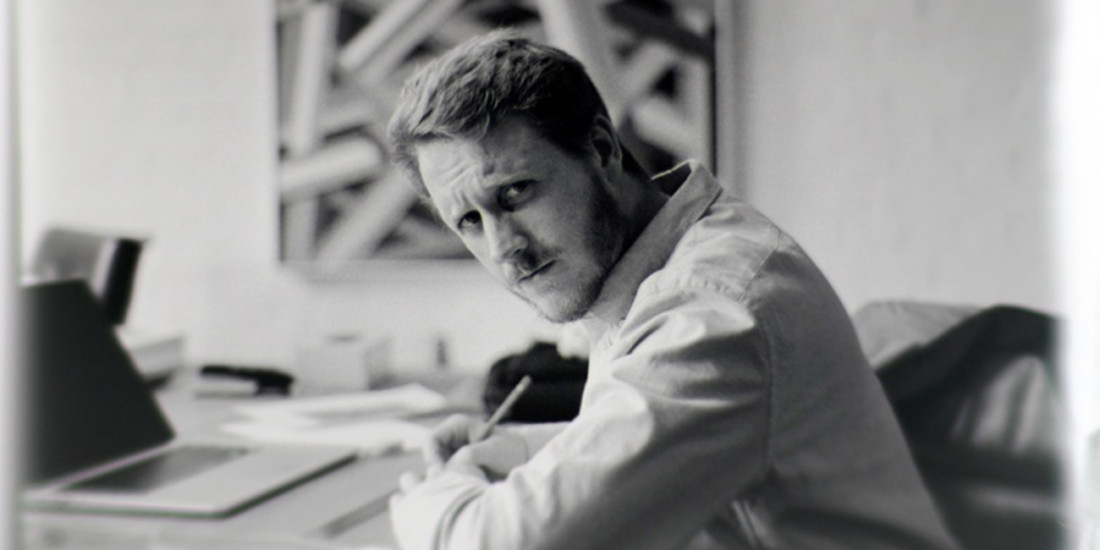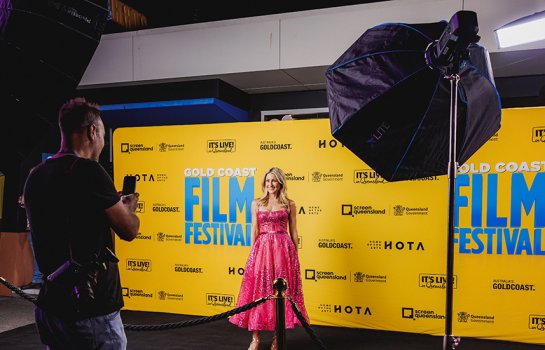Tom Noakes, writer and director
The incredible energy an audience brings is inexplicable ...
As a little tacker growing up on the Sunshine Coast in the ‘90s, Tom Noakes saw shooting skate videos as just another way to pass those long sticky stretches of daylight between the school bell and dinnertime. But often, it’s the things that brought us happiness in our childhoods that set us on the path to success as adults. Unbeknownst to Tom, those shoddily shot home videos would prove to be a very early training ground for a future career in film. After graduating from high school, Tom learnt the basics of filmmaking at QUT before migrating south to Sydney to complete post-graduate study at the Australian Film Television and Radio School. He’s spent the past decade crafting commercials that inject an offbeat sense of humour and knack for narrative into the sometimes-staid world of advertising, but it wasn’t until 2013 that the young filmmaker had the opportunity to take his work to the world stage. For the first time, the Doritos Crash The Super Bowl competition was opened to filmmakers from around the world, inviting them to take a punt at producing the winning commercial which would not only be aired during the Super Bowl but also earn its creator a snappy $1 million. Despite never having watched an American football game, Tom’s work Finger Cleaner was the only non-American entry to make it to the final five. The opportunities have kept sprouting over the past months, with Tom earning himself a place in ABC TV and Screen Australia’s new initiative Fresh Blood, which offers emerging comedy creators funding to produce a short-form web series. Tom linked up with good friends Matt Kamen and Will Goodfellow to create the dark comedy series Corn Cobs, which probes and pokes at a friendship between two sweet-seeming sociopaths. Following the show’s launch on ABC iView last Sunday June 15, The Weekend Edition caught up with Tom to chat Doritos, Corn Cobs and costly smiles.
How did you first get involved in the Fresh Blood initiative?
I was sitting around in my studio with a good friend, director and writer Matt Kamen, and we started coming up with short, punchy, economic ideas that we could shoot using the resources we had. And we came up with two guys and a food truck … From there, we brought on a really good friend of mine, a writer Will Goodfellow. We put together the application for Fresh Blood because we heard they were offering funding for up to $10,000 and it was also great to have those imposed deadlines. There’s an old saying in film that ‘a script is never finished, it’s only abandoned’ and it’s so true. So we applied with Corn Cobs, and we got it. Fresh Blood is a pretty bold experiment for them in trying to source new talent and new writers, and give them a bit of money to see if they can produce quality content.
For readers who haven’t had the pleasure of meeting Patrick and Terry, what can you tell us about the pair?
Well they’re two seemingly well-adjusted, nice guys but they just have this sociopathic lack of empathy, with the exception of their friendship. They’re best friends and they look out for each other and experience everything that comes along with friendship – jealousy and betrayal – but at the end of the day they still love each other and are perfect for each other because they’re the only people in the world who are broken enough to understand each other. But that comes at an expense, with this moral ineptitude …
Where do you hope to take Patrick and Terry in the future?
Ideally we’ll make more of these and it comes down to either funding it ourselves, or the ABC funding it or looking at getting funding from another broadcaster. We’d like to extrude that friendship more and look at it as more of a story arc. It’s meant to be a TV series about friendship – as weird as it is, it’s about friendship.
The series was released on ABC iView last week, how are you feeling now that it’s out in the world?
We’re pumped that we got something out that’s closer to the style we’re trying to strive for, which is hard to nail – and I don’t know if we nailed it 100% – but it’s definitely the closest thing I’ve ever done to something I want to be aligned with.
That must be a constant challenge – to balance your personal style with what the clients want …
Very rarely do art and commerce marry well, so it’s pretty hard. But it’s a job and of course you find the fun of it and it’s really satisfying. If you get a trusting agency and creatives, the process can be really collaborative. The more you can prove you’re a trustworthy collaborator, the more freedom you get. Before the Doritos Crash The Super Bowl competition, it was pretty hard to convince people, but now people are listening to my suggestions more and are more willing to collaborate. At the end of the day, a commercial always has an agenda and that is to sell products – that’s the top priority, and it should be. So your brand and your voice is absolutely secondary to that, but I do believe they work together and you’ve got a mutual goal. You still hone your craft and you have challenges because you don’t have control – all those skills are really valuable. It’s a good training ground.
What’s the most memorable thing that happened on set, for good or bad reasons?
Well John Brumpton, who is a well-known, established actor, plays the hobo in one episode. We shot and wrapped and then went back through the episode and realised we just needed this one smile from him. He lives in Melbourne so we had to fly him all the way back to Sydney for one smile … It just goes to show the meticulous dedication to detail and endeavour for perfectionism. You do all this preparation but still at the last minute you don’t really understand what you’re making. You do months and months of script work and then you get on set and you’re like, ‘Ahh, that’s what it is.’
Does having three co-writers with their own interpretations make it harder when bringing the script to life?
Surprisingly not as much as you’d think. Matt, Will and I are pretty aligned with our tastes and we’ve got a similar language in breaking down and talking about scripts, so there was only really one time where that happened and we worked it out. It’s always great to make something and have that product there and be proud of it and work with actors you really respect, but the best part of this whole process was sitting in my little studio with Will and Matt jamming out episodes. That was awesome.
What was your biggest challenge in getting the series to air?
For me, it’s definitely the writing. Knowing when to stop. In directing, there are certain limitations and practicalities that help you arrive at a decision – and that’s not to say there aren’t ambiguities – but writing is just so hard, to get confidence in what’s on the page. This was one of the first times in years and years that we’ve written something that we really wanted to see get made. But it was tough to get there – it was months and months of writing for what is seven minutes of film.
Your entry in the Doritos Crash The Super Bowl competition was hilarious but clearly not everybody’s taste. What was the most interesting reaction it triggered – did some viewers fail to get it?
Oh yeah. I think in Australia everyone is pretty good for a laugh and doesn’t take themselves too seriously, so Australia handled it really well. In America, they loved it, but it definitely polarised people … but then that’s what made it fun. It was a really great experience, I wouldn’t change it for the world.
What first drew you to filmmaking? Can you remember how old you were?
It’s definitely since my childhood – I started making stupid videos when I was about 12. I started out with skateboarding, but I filmed everything – honestly, everything. And from there I looked at pathways and asked myself what I’d be happiest doing and what would open up the life opportunities that I could incorporate into my work, and it was film. Of course you still go through those philosophical crises where you question what you’re doing and how long it’s taken you to get there. But I can’t think of anything else I’d rather be doing, or I’d be better at doing. I just have to do this.
Which direction do you hope to head in – do you ultimately want to make features or are you keen to stick with commercials?
Absolutely features. It doesn’t matter if it’s features or TV for me, they’re very similar mediums. Of course there are differences between them but I only want to do a certain type of story and it can sit in either of those formats. And that’s the end game – that’s what we’re striving for.
Do you have any words of wisdom for other hopeful writers or directors?
Find collaborators and people you really gel with. I hear about so many filmmakers who are just lost and full of fear, floating around in this big expanse. Also make sure you have friends outside of film; I’ve got a group of friends who inspire me way more than filmmaking – they’re my muse.
What’s your personal definition of ‘success’?
What I defined as success five years ago is very different to today, but if I could do just one thing that I’m proud of before I die – one thing that really connected with people – then that’d be success. But the main thing about success is just happiness; I’d do that one thing because it makes me happy. If I could be happy living up in the Peruvian Alps with just a dog, then I’d do that. Happiness, in my situation, is shared – whether that shared enjoyment is in a cinema with a bunch of people or just with friends. We played Corn Cobs to a bunch of people for the first time recently and it was really satisfying. By the time you show a piece to everyone, there’s nothing in it you find funny anymore, it’s just so sapped of its energy and repetition kills it, so to show people again was really good. The incredible energy an audience brings is inexplicable – just being present with other people, there is a kind of connectedness. That was enjoyable, making people laugh. Well I think they were laughing … either that, or they were being very kind. It made me feel happy anyway.


